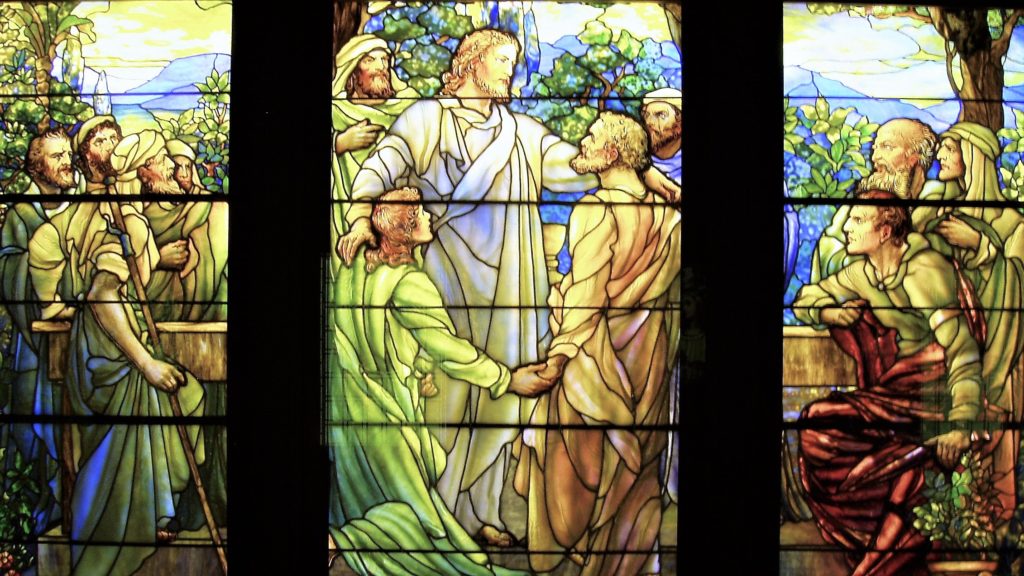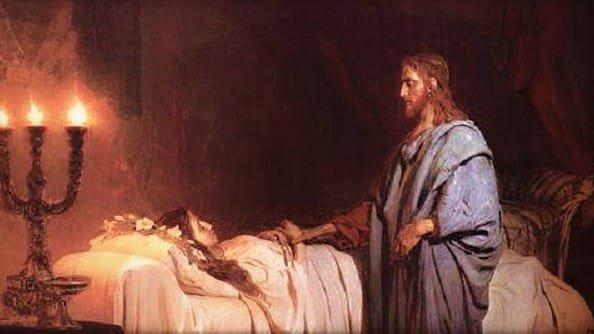WEDNESDAY 4TH WEEK IN ORDINARY TIME GOSPEL, COMMENTARY. NO PROPHET IS HONORED IN HIS OWN COUNTRY (Mk 6:1–6).

GOSPEL OF WEDNESDAY OF THE 4TH WEEK IN ORDINARY TIME
Mk 6:1-6
NO PROPHET IS HONORED IN HIS OWN COUNTRY.
Jesus departed from there and came to his native place, accompanied by his disciples. When the sabbath came he began to teach in the synagogue, and many who heard him were astonished. They said, “Where did this man get all this? What kind of wisdom has been given him? What mighty deeds are wrought by his hands! Is he not the carpenter, the son of Mary,and the brother of James and Joseph and Judas and Simon? And are not his sisters here with us?”
And they took offense at him. Jesus said to them, “A prophet is not without honor except in his native place and among his own kin and in his own house.” So he was not able to perform any mighty deed there, apart from curing a few sick people by laying his hands on them. He was amazed at their lack of faith.
COMMENTARY TO THE GOSPEL OF ST. MARK (WITH PERMISSION).
- vv. 1-3 Jesus is here described by his occupation and by the fact that he is the son of Mary. Does this indicate that St Joseph is dead already? We do not know, but it is likely. In any event, the description is worth underlining: in the Gospels of St Matthew and St Luke we are told of the virginal conception of Jesus. St Mark’s Gospel does not deal with our Lord’s infancy, but there may be an allusion here to his virginal conception and birth, in this being described as “the son of Mary.”
- “Joseph, caring for the child as he had been commanded, made Jesus a craftsman, transmitting his own professional skill to him. So the neighbours of Nazareth will call Jesus both faber and fabri filius: the craftsman and the son of the crafts man” (St. Josemaria, Christ is passing by, 55). This message of the Gospel reminds us that our vocation to work is not marginal to God’s plans.
- “The truth that by means of work man participates in the activity of God himself, his Creator, was given particular prominence by Jesus Christ — the Jesus at whom many of his first listeners in Nazareth ‘were astonished, saying, “Where did this man get all this? What is the wisdom given to him?… Is not this the carpenter?” (Mk 6:23). For Jesus not only proclaimed but first and foremost fulfilled by his deeds the ‘gospel’, the word of eternal Wisdom, that had been entrusted to him. Therefore this was also ‘the gospel of work’, because he who proclaimed it was himself a man of work, a craftsman like Joseph of Nazareth (cf. Mt 13:55). And if we do not find in his words a special command to work — but rather on one occasion a prohibition against too much anxiety about work and life (Mt 6:25-34) — at the same time the eloquence of the life of Christ is unequivocal: he belongs to the ‘working world’, he has appreciation and respect for human work. It can indeed be said that he books with love upon human work and the different forms that it takes, seeing in each one of these forms a particular facet of man’s likeness with God, the Creator and Father” (St. John Paul II, Laborem exercens, 26).
- St Mark mentions by name a number of brothers of Jesus, and refers in general to his sisters. But the word “brother” does not necessarly mean son of the same parents. It can also indicate other degrees of relationships — cousins, nephews etc. Thus in Gen 13:8 and 14:14 and 16 Lot is called the brother of Abraham (translated as “kinsman” in RSV), whereas we know that he was Abraham’s nephew, the son of Abraham’s brother Haran. The same is true of Laban, who is called the brother of Jacob (Gen 29:15) although he was his mother’s brother (Gen 29:15); there are other instances: cf. 1 Chron 23:21-22, etc. This confusion is due to the poverty of Hebrew and Aramaic language: in the absence of distinct terms, the same word, brother, is used to designate different degrees of relationship.
- From other Gospel passages we know that James and Joses, who are mentioned here, were sons of Mary of Clophas (Jn 19:25). We know less about Judas and Simon: it seems that they are the apostles Simon the Cananaean (Mt 10:4) and Judas the son of James (Lk 6:16), the author of the universal epistle, in which he describes himself as “brother” of James. In any event, although James, Simon and Judas are referred to as brothers of Jesus, it is nowhere said they were “sons of Mary”, which would have been the natural thing if they had been our Lord’s brothers in the strict sense. Jesus always appears as an only son to the people of Nazareth, he is “the son of Mary” (Mt 13:55). When he was dying Jesus en trusted his mother to St John (cf. Jn 19:26-276), which shows that Mary had no other children. To this is added the constant belief of the Church, which regards Mary as the ever-virgin “a perfect virgin before, while, and forever after she gave birth” (Paul IV, Cum quorumdam).
- vv. 5-6 Jesus worked no miracles here: not because he was unable to do so, but as punishment for the unbelief of the townspeople. God wants man to use the grace offered him, so that, by cooperating with grace, he become disposed to receive further graces. As St Augustine neatly puts it, “He who made you without your own self, will not justify you without yourself” (Sermon169).
- The main fault of the Nazarenes, among others, is that they did not recognize the transcendent value of Jesus’ humanity. That attitude made it impossible for them to receive the Savior and enter into the path of salvation, which is Christ Himself.
- Saint Augustine comments: “True man and true God … This is the Catholic faith; he who confesses both, is Catholic, and has [in Christ] a destiny and a way. He is the destiny to where we are going. And He is the Way which we tread to arrive at our destiny. Let us go through Him, and we will not go astray (Sermon 93).”
- Jesus is the source of life. His holy Humanity is an instrument, perfectly linked to his divinity, to communicate supernatural life. He has used his holy Humanity to communicate the life of his divinity. Moreover, that very Holy Humanity, united with the Word, is also for us a source of bodily life. The Gospel, in effect, tells us that from Him came a power that healed everyone (Lk 6: 17-18).
- St. Augustine says: “What safer happiness than ours, being that he who prays with us is the one who gives what us what we ask? Because Christ is Man and God. Whereas man asks; so God grants (Sermon 217).
- We must have a great faith and devotion towards the sacred Humanity of Jesus Christ. This is how the saints lived, such as San St. Bernard, St Francis of Assisi or St. Teresa of Avila.
AS FOR THE QUESTION WHETHER JESUS HAD BIOLOGICAL BROTHERS AND SISTERS. THE ANSWER IS NO. WHY? CLICK HERE.
VIDEO COMMENTARY
TOPIC: TOPIC: IF YOU WANT TO BE A SAINT, DOES IT MEAN PAYING FOR IT WITH YOUR MONEY?
In today’s gospel reading (Mark 6:7-13), Jesus, after choosing his first disciples and telling them to be fishers of men, after completing the cast of twelve He will train to establish His Church, is now sending them two by two. He asks them to preach repentance – a deeper one called metanoia where one makes a radical conversion to follow Christ – and anoint the sick with oil to heal them and cast out demons. Our mission is to bring others to sainthood along with us. Should we give up our material possessions in order to attain sainthood?
READING FROM A SPIRITUAL AUTHOR.
The mind’s sense of taste teaches the art of spiritual discernment
From the treatise “On Spiritual Perfection” by Diadochus of Photiké
The light that true knowledge gives out is the ability to distinguish unerringly what is right from what is wrong. This being so, the path of uprightness – which leads the mind towards God, the radiant sun of righteousness – takes that same mind into an unbounded light of knowledge and then leads it on to seek trustingly for love.
Those who are struggling in battle ought always to keep their souls free of the tumultuous waves of distraction. If they do this, the mind will be able to distinguish among the thoughts that come to it. The good thoughts, sent by God, they can store in the treasure-house of their memory. The evil thoughts, sent by the devil, they can throw out. In just the same way, when the sea is calm, the fisherman can see to the bottom of it and practically no fish can escape his gaze; but if it is stirred up by wind and storm, it becomes opaque when in calm times it was transparent – and when that happens, even the wiliest fisherman is wasting his time.
Clearing and purifying the mind is the task of the Holy Spirit alone – just as when a house is being burgled, the spoils can only be recovered if a strong man bursts in and despoils the burglar. Therefore we ought to keep our souls at peace so that the Holy Spirit is welcome there, so that the lamp of knowledge will always be lit – for when it is, the dark and bitter impulses of the devil will be easy to see and they will be reduced to creeping helplessness as they are caught in that holy and glorious light.
This is why St Paul says ‘Do not extinguish the Spirit’ – that is, do not sadden the Holy Spirit with evil acts and thoughts, or his light may cease to protect you. Of course the eternal and life-giving Spirit is not actually extinguished: rather, it is the sad turning away of the Spirit that leaves the mind wrapped in gloom and without the light of knowledge.
The mind has a perfect sense of taste that is able to discern and distinguish. When we are healthy, our body’s sense of taste can unerringly distinguish good from bad, so that we desire only what is good for us. The same applies to our mind, as long as it is in perfect health and not disturbed by too many cares: it can very well perceive and desire the consolations that God offers. Through the action of love, it has an unfading memory of their taste, and so it can always seek what is best. As St Paul says: My prayer is that your love may increase and never stop improving your knowledge and deepening your perception, so that you can always recognise what is best.
Stay safe and healthy. God bless. Fr. Rolly Arjonillo.
Grant us, Lord our God, that we may honor you with all our mind, and love everyone with rightful affection. Through our Lord.
Collect prayer 4th week in Ordinary Time
Stay updated: subscribe by email for free TO OUR NEW WEBSITE www.catholicsstrivingforholiness.org (PUT YOUR EMAIL IN THE SUBSCRIBE WIDGET).
We are also in www.fb.com/Catholicsstrivingforholiness. Kindly help more people in their Christian life by liking our page and inviting your family, friends and relatives to do so as well. Thanks in advance and God bless you and your loved ones! Fr. Rolly Arjonillo


